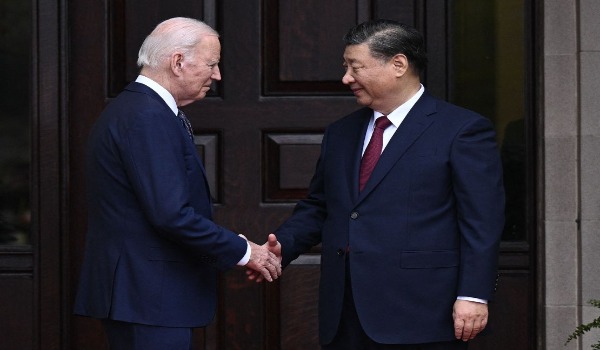Biden hails productive talks as Xi says China is willing to be ‘partner and friend’ of US
US President Joe Biden and his Chinese counterpart Xi Jinping tried to prevent the superpowers’ rivalry spilling into conflict when they met Wednesday for the first time in a year at a high-stakes summit at the Filoli country estate on the outskirts of the San Francisco Bay Area.
At the landmark meeting Wednesday, Chinese leader Xi presented an amicable China ready to improve ties with the United States with US marking a noticeable shift in tone for Beijing as it looks to minimize friction with Washington.
A press conference with China’s Foreign Minister Wang Yi in California following the bilateral meeting said: “(The Xi-Biden meeting) is sure to become a milestone … and a major event in today’s international relations, pointing out that the four-hour face-to-face talks were held “amidst the backdrop of a critical stage in China-US relations.”
Xi also took a conciliatory tone speaking at a dinner event in front of American CEOs later that day.
He told the audience the most fundamental question shaping US-China relations is whether they are rivals or partners.
“If we regard each other as the biggest rival, the most significant geopolitical challenge and an ever-pressing threat, it will inevitably lead to wrong policies, wrong actions and wrong results,” Xi told an audience that included Apple CEO Tim Cook and Tesla CEO Elon Musk.
“China is willing to be a partner and friend of the United States,” he added.
The meeting between Xi and Biden has marked a shift away from its hardline position on the United States. This softening comes as China grapples with a troubled economy and is keen to highlight Xi as a powerful and capable world leader.
According to statements from both the US and China the two sides agreed to restore military communications and to combat the flow of fentanyl from China to the US during several hours of “constructive” meetings.
China labeled the talks as “positive” and “comprehensive” — while also highlighting Xi’s efforts to spell out Beijing’s non-negotiables such as its position on Taiwan and perceived American efforts to contain China’s rise.
Xi also called on the US to “not scheme to suppress or contain China,” in an apparent reference to America’s strengthening of its alliances in Asia and what Beijing sees as efforts to slow its economic development with trade and investment restrictions on high tech. Washington says those curbs are intended to protect its national security against an assertive and authoritarian China.
While the Xi-Biden meeting helped to advance dialogue and cooperation, the meeting was also a chance for both sides to highlight their differences — and showed areas where they did not reach consensus, which analysts say will continue to define their contentious relationship.
And even within areas where the duo did come to agreement, there remains fragile ground.
China’s announcement of the restoration of military communications, which the Biden administration had long pushed for, said those would resume “on the basis of equality and respect.”
“What that means is in the future anytime China is annoyed with anything the US does, China can say it’s cutting off military-to-military dialogues again and blame it on the US (for) no longer making China feel ‘respected,’” said Wen-Ti Sung, a Taiwan-based fellow with the Atlantic Council’s Global China Hub.
“(This) undermines the basis of the talks’ resumption and existence,” he added.
On Taiwan, the self-ruling democracy that China’s ruling Communist Party claims, Xi urged the US to stop arming the island and to support China’s “peaceful reunification,” according to China’s readout of the meeting released by state media.
“China will eventually achieve reunification, and will inevitably achieve reunification,” Xi was quoted as saying — another line that was also trending on Chinese social media following the meeting.
Biden, on his part, reaffirmed the long-standing American position on Taiwan and its opposition to any unilateral changes to the status quo, saying cross-strait differences must be “resolved by peaceful means,” according to a readout from the White House.
Xi’s visit came as the Chinese economy struggles with a property market crisis, high local government debt and record youth unemployment. At the same time, crackdowns across several sectors have pummeled business confidence and led many to question what opportunities remained in China.
“These challenges are tremendous,” said Alfred Wu, associate professor at the Lee Kuan Yew School of Public Policy at the National University of Singapore, who noted that in California, Xi wanted to show viewers back home his “leadership capacity in the foreign affairs arena” and that he is highly regarded in America and a world leader on par with Biden.
The optics of a warm welcome and the display of a commanding presence next to Biden are critically important for Xi, who analysts say was not only keen to stabilize a complicated relationship at a time of economic weakness, but also to present himself to his domestic audience as skillfully helming China’s foreign affairs.
But whether this shift is a lasting one for the contentious relationship will be put to an immediate test, however, the comments made by Biden during a solo press conference after the meeting. There, the President reiterated his view that Xi is a “dictator,” after being asked by a reporter whether he stood by a comment saying as much this past June.
Beijing reacted with vitriol, with the remark seen as casting a shadow over tentative progress in advancing dialogue between the two sides following a visit from US Secretary of State Antony Blinken.
When asked about Biden’s latest comment at a Chinese Foreign Ministry briefing on Thursday, a spokesperson called it “extremely erroneous” and an “irresponsible political maneuver, which China firmly opposes.”
“What needs to be pointed out is that there will always be some people with ulterior motives attempting to undermine China-US relations. They will not succeed in doing so,” spokesperson Mao Ning said.
Biden himself seems to indicate hope that the two can work through their differences as he noted that “(Xi) is a dictator in the sense that he is a guy who runs a country that is communist” and that the Chinese government “is totally different than ours.”
“Anyway,” he added. “We made progress.”
Chinese state broadcaster CCTV highlighted how Biden invited Xi for a walk around the leafy estate where the meeting took place and that the American leader “personally escorted him to his car to bid goodbye” — a detail that was also highlighted in another top-trending hashtag on Chinese social media.
The positive coverage of the event was a break from the typical rhetoric critical of the US that often plays across Chinese state and social media. Anti-US rhetoric has been a significant theme boosting growth in Chinese nationalism as tensions flared between the two in recent years.
LENS with input from wire report




